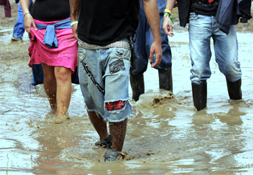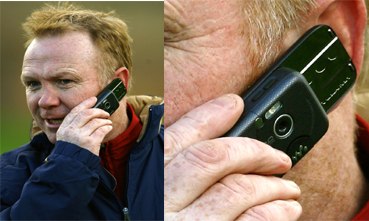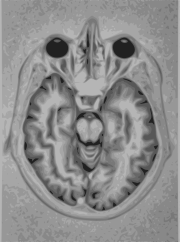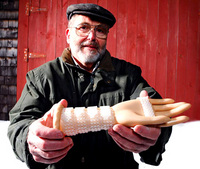Tag: tech Digest
A Fair(y) Use Tale
Eric Faden, professor at Bucknell, has created a video to explain copyright to the beginner. What makes this unusual is that it’s all told by Disney characters. . . in extremely small snippets so as not to violate copyright. The film is very funny, very informative and very subversive. If you’ve ever wondered just “what” “is” “copy” “right” (or if you enjoy the discomfiture of Disney), check the video after the jump. [GT]
Pouchlink: vending machine forms packages on demand
Instead of having to fill vending machines with pre-set volumes of particular drinks, Pouchlink would allow the contents of plastic envelopes to be mixed and dispensed on the spot. Since the machines would be hooked up to mains water supplies, water wouldn’t have to be trucked around, and the plastic pouches could be made of biodegradeable materials, allowing the entire process to become much more efficient as well as eco-sound. Further refinements could let you program what drink you like into your mobile so you could upload it to the machine on the spot. [GT]
Drinks vending machines can form pouches on demand [via Core77]
"Slidingly engaging fasteners" to replace zippers, velcro
Annoyed a decade ago when his zipper broke on the way to the airport, architect and inventor Leonard Duffy decided to design a replacement. The result: “slidingly engaging fasteners” which are quiet, carry a bigger load than velcro or zippers, don’t wear down with use, and can replace anything from butterfly clips which hold tensor bandages together, to shoelaces. Over 150 companies have contacted Duffy to investigate the product further, so it’s likely coming soon to a foot, chest, or bandage near you. [GT]
The New Velcro [via TechEBlog]
Hasan Elahi blogs himself to prove he's not a terrorist
At TrackingTransience.net you can watch Hasan Elahi’s updates multiple times a day, as he posts about his activities and constantly uploads camphone shots of himself to establish that, whatever he may be, it is not a terrorist. The project began about 3 years ago when he was mistakenly added to the US government’s terrorist watch list, and to prove his total innocent, Elahi, Rutgers professor and artist, decided to make his entire life completely open. Art project or testimonial of innocence, his site has had hits from the Pentagon, the Secretary of Defense, and the Executive Office of the President. [GT]
Tech Digest readers have spoken about Wi-Fi dangers
 Manage to free up some of your time last night to catch the BBC’s Panorama special concerning Wi-Fi dangers to your health? No? Too busy watching Coronation Street on ITV? This is your health we’re talking about, readers! Although that Ken, ruining Deidre’s life, makes for interesting viewing…
Manage to free up some of your time last night to catch the BBC’s Panorama special concerning Wi-Fi dangers to your health? No? Too busy watching Coronation Street on ITV? This is your health we’re talking about, readers! Although that Ken, ruining Deidre’s life, makes for interesting viewing…
Best digital camera to travel with? That's the Canon Ixus 70, Lost Weekend claims

Our brand spankin’ new travel-blog-for-men, Lost Weekend, is going through the motions of kitting you out with the best travel gadgets to throw into your rucksack. First on board is the Canon Ixus 70 digital camera…
Win the ultimate music festival prize in the UK, at Shiny Shiny
 Got a burning desire to go to a big dirty music festival this year, but, err…no festival to go to? And no camping gadgets and what-not to help you out once you get there? Never fear, because the girls of Shiny Shiny have your back, with a whopper of a competition over there. Susi says of the competition –
Got a burning desire to go to a big dirty music festival this year, but, err…no festival to go to? And no camping gadgets and what-not to help you out once you get there? Never fear, because the girls of Shiny Shiny have your back, with a whopper of a competition over there. Susi says of the competition –
Guess the mobile phones sportsters Lee Westwood and Alex McLeish are holding

Something to stretch the minds this Tuesday afternoon as you while the hours away skiving whilst your boss’s back is turned – guess the mobile phones English golfer Lee Westwood is sporting here, and Scottish footballer Alex McLeish has in his sweaty little palm under the jump…
Web censorship more widespread than expected
A study carried out by the OpenNet Initiative shows that at least 25 countries around the world block websites for what are usually political or social reasons. China, Iran, Myanmar, Syria, Tunisia and Vietnam had the most extensive filters for political sites. Iran, Oman, Saudi Arabia, Sudan, Tunisia, the United Arab Emirates and Yemen had the strictest social-filtering practices, blocking pornography, gambling and gay and lesbian sites. The study was limited in its scope It didn’t include any countries in North America or Western Europe on grounds that filtering practices there have been better known than elsewhere, and they wanted to study something new. [GT]
Spare your brain in morning and evening

Multitasking is great for computers, but not so much for humans generally, and multitasking is hardest in early morning and late evening, making sophisticated tasks from computer programming, to driving, more difficult. Nor is it simply about being tired; the study assessed melatonin levels in the blood, which related to time of day rather than exhaustion. More studies will indicate precisely why early morning and late evening correlates to impaired behaviour, but until then, sleep late, and watch cartoons at midnight. Works for me. [GT]
Multitasking is hardest in the early morning






















